 It may sound crazy to say that we have to embrace the suffering this life throws at us. The thing is that if we ignore the pain or claim that we have victory over every pain, sorrow, or fiery dart from hell, then we have set ourselves up for even more pain. The reality is that there is a lot of pain and sorrow in the world today – rape, sickness, heartache, poverty, death, betrayal, bullying, addictions, and more. If we are going to live in this world, as we do, then we must know how to process the suffering and how to help others walk through it.
It may sound crazy to say that we have to embrace the suffering this life throws at us. The thing is that if we ignore the pain or claim that we have victory over every pain, sorrow, or fiery dart from hell, then we have set ourselves up for even more pain. The reality is that there is a lot of pain and sorrow in the world today – rape, sickness, heartache, poverty, death, betrayal, bullying, addictions, and more. If we are going to live in this world, as we do, then we must know how to process the suffering and how to help others walk through it.
When I was in college someone told me that the reason that people got sick was because they had sinned against God. If they fully obeyed God, then they would never get sick. This person then backed up this claim by declaring that their good health was due to their standing before the Lord. As I stood there listening to this bold claim, I couldn’t help but think of Job.
The book of Job is perhaps the oldest book in the Bible and tells the story of Job who lived around the same time as Abraham. The story itself is a bit depressing as it details how Job, a follower of the Creator King, is attacked by the evil one and in a very short amount of time loses his children, wife, house, land, wealth and health. His friends show up and tell Job that all his problems are due to his sinful actions against God. Job refuses to accept this logic and cries out to God in an effort to find out what is happening. At the end of the book, God shows up and destroys the argument of Job’s friends. Then he turns to Job and instead of explaining everything, he asks Job where he was when the earth was formed and the seas were created. In other words, God is telling Job to stop trying to figure out the cause and effects of everything and start trusting Him.
This may sound like a cop-out to us in the modern age. We want everything to be logical and have a reason. We don’t like unsolved mysteries or cryptic statements of trust. Yet, if we think back to the very beginning, the Scriptures are clear that we are to trust the Creator King. This doesn’t mean – and please hear me loud and clear here – that God causes pain and suffering in our lives. Far from it! God is not the author of evil, suffering, pain or heartache. Everything negative and painful in our lives comes from three places: from our own poor decisions, attacks from the evil one or from effects of living in the present evil age. What the Creator King does, is to take all the pain and suffering we experience and transform it through the cross into something else. Something, dare I say, restorative and beautiful albeit scarred and wounded, like the nail scarred hands of Jesus.
Remember how I mentioned that my wife and I had experienced two miscarriages? Those miscarriages caused us considerable pain and heartache. We even started to doubt God and began to lose trust in him. Yet, through all the pain he taught us that people, even unborn babies, are worth loving even if the ending is full of pain. The lessons that my wife and I learned through the pain of the miscarriages helped us open up our hearts to our adopted son and to the child whom we had for only eleven days. Was the miscarriages part of God’s plan? I don’t think so! I think they were the results of frail bodies and fiery darts from the evil one. However, God took the pain of our lives and transformed it into something wholesome.
When I talk about embracing the suffering of living in the tension, this is what I mean: we have to let God take the sorrow of our lives and transform it into good. If we always focus on the victory passages of the Scriptures then we would never know how to live through the tough times. Similarly, if we only focused on the suffering portions, we would become depressed and miss seeing his mighty hand at work. We have to learn to live in the tension between both aspects of the Scriptures, trusting the Creator King who loves us more than we can ever know.
Another aspect of embracing suffering can be found in the life of Jesus. Philippians 2 talks about how Jesus freely emptied himself to become like us in every way. As such, he experienced a lot of pain and suffering that he did not have to. I’m not just talking about the cross and the physical pain that it bought. I’m talking about his stepdad dying, working long hard days to support his mother and young siblings, sweating under the hot sun, walking for miles upon miles across the desert, and sleeping on the ground. His brothers and sisters thought he was crazy, his friend betrayed him unto death and all his other friends abandoned him in his hour of need. On top of all this, Jesus had hundreds, if not thousands, of people trying to get his attention all the time, leaving him with very little time for himself. As a pastor, I can vouch for the emotional, spiritual and physical drain that comes with having people constantly coming up and looking for something from you! Yet Jesus embraced all this suffering as he knew that it was through the suffering that the reign and rule of God would break into human history.
 When my wife and I were in our mid-twenties, we were invited to join a team of folks who were planning to start a new church in Sweet, Idaho, an hour’s drive north of Boise. At first we were just going to help out on Sunday evenings for about six months while the church got up and running. God, however, had different plans. One thing led to another and soon we were selling our house and moving to Sweet, to work with the church and love the community. The next nine years were full of joy, happiness, sorrow and heartache. It was hard giving up one lifestyle to embrace another. To go from riding a bicycle to work, to driving an hour each way; to go from a vibrant social life in the big city to embracing a slower pace of life among a predominantly retired community. Then there were the hours of volunteer work with the church, setting things up for the service, tearing it down, week in and week out, planning different events, etc.
When my wife and I were in our mid-twenties, we were invited to join a team of folks who were planning to start a new church in Sweet, Idaho, an hour’s drive north of Boise. At first we were just going to help out on Sunday evenings for about six months while the church got up and running. God, however, had different plans. One thing led to another and soon we were selling our house and moving to Sweet, to work with the church and love the community. The next nine years were full of joy, happiness, sorrow and heartache. It was hard giving up one lifestyle to embrace another. To go from riding a bicycle to work, to driving an hour each way; to go from a vibrant social life in the big city to embracing a slower pace of life among a predominantly retired community. Then there were the hours of volunteer work with the church, setting things up for the service, tearing it down, week in and week out, planning different events, etc.
I lost count of the times my wife and I sat in our living room, crying. The toil of starting a new church took its toll on us, stretching us to our limits and beyond. We were very low at the time and even discussed looking for pipes online so that we would be able to utilise the mood enhancing properties of cannabis. More than once we wanted to quit and run away. The only reason why we didn’t was because we knew beyond a shadow of a doubt that God had asked us to go to Sweet. And, since he was our King, we had to obey him until he released us from our job. This is suffering. This is the pain of the here and not yet of the kingdom of God. The pain that comes with obeying the Creator King and proclaiming his word to a world that does not want to listen.
Matthew 11:12 is a cryptic verse in which Jesus says, “From the time of John to Baptist until now the kingdom of heaven has been forcing its way in – and the men of force are trying to grab it!” (TKNT) We are in a battle between the kingdom of darkness and the kingdom of light. The moment you start proclaiming Jesus to the world, you had better watch out as you have just painted a target on your back. All hell is going to try to stop you from obeying the Creator King because the evil one does not want to let go of his territory. Yet, we have been called to fight the fight, to proclaim the kingdom of God into every nook and cranny of this world, regardless of the cost!
To embrace the suffering of the kingdom is to know that starting a church, loving the unlovable, working with the poor, helping those with addictions, or simply telling your neighbor about Jesus, all come with pain. There will be push back and, at times, negative consequences that come from obeying Jesus. You might experience sleepless nights, long days, emotionally-draining meetings, spiritual attacks, strained relationships, emotional and/or physical isolation, loss of income, and, perhaps even death. I am reminded of the calling of the prophet Jeremiah, who was told by God that the people of Israel would “fight against” him should he obey what God was telling him to do (Jeremiah 1:19). And the apostle Paul, who was shown by God “how many things he is going to have to suffer for the sake of [his] name” at the time he bowed his knees to the King (Acts 9:16).
We have to be willing to embrace the pain that comes with joining God on his mission. We have to be willing to step out and take a risk, to choose to love even though we know that we may be hurt. Too many followers of Jesus have hardened their hearts toward people because they have been hurt too much. They still serve but it is out of duty rather than love. We must keep a soft heart and remember that the pain is worth it. And in order to do that we must embrace the suffering of Jesus as our own.
[box]The above post is an excerpt from my book, The Here and Not Yet (pages 90-92)[/box]
 Jalāl al-Dīn Rūmī (Sept. 30, 1207 – Dec. 17, 1273), better known as Rumi, was a Persian born Sufi Muslim teacher, religious leader, poet, and Islamic scholar. Since the day that they were written, Rumi’s poems have been enjoyed by countless people in multiple languages. In recent decades, his poems have enjoyed a renaissance in America with Rumi becoming “one of the best-selling poets in the United States.”[1]
Jalāl al-Dīn Rūmī (Sept. 30, 1207 – Dec. 17, 1273), better known as Rumi, was a Persian born Sufi Muslim teacher, religious leader, poet, and Islamic scholar. Since the day that they were written, Rumi’s poems have been enjoyed by countless people in multiple languages. In recent decades, his poems have enjoyed a renaissance in America with Rumi becoming “one of the best-selling poets in the United States.”[1]
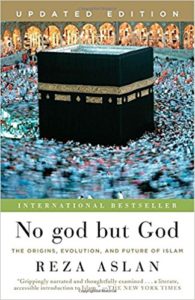 Islam rose to the forefront of the global consciousness on September 11, 2001 through the bloody actions of several self-proclaimed followers of Islam. Yet in spite of the almost constant barrage of information since then by news pundits, political leaders, and religious personalities, it seems that most people living in the United States still don’t understand the basic concepts, history, or divisions within the religion. Written four years after the 9-11 terrorist attacks by Reza Aslan, a Sufi Muslim immigrant to the USA from Iran, the book
Islam rose to the forefront of the global consciousness on September 11, 2001 through the bloody actions of several self-proclaimed followers of Islam. Yet in spite of the almost constant barrage of information since then by news pundits, political leaders, and religious personalities, it seems that most people living in the United States still don’t understand the basic concepts, history, or divisions within the religion. Written four years after the 9-11 terrorist attacks by Reza Aslan, a Sufi Muslim immigrant to the USA from Iran, the book 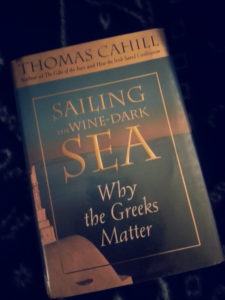 Though it is common to think that that we who are alive are the ones who are braving new territory, the reality is that we are always following someone else. In his book
Though it is common to think that that we who are alive are the ones who are braving new territory, the reality is that we are always following someone else. In his book  A look through the Scriptures, especially the New Testament, reveals a lot of passages about the victory that comes through the new life in the kingdom. We become new people with a new family built upon love, grace, mercy and forgiveness. No matter what pain or sorrow we have experienced before, we now have a chance at a new life. The old is gone; behold the new.
A look through the Scriptures, especially the New Testament, reveals a lot of passages about the victory that comes through the new life in the kingdom. We become new people with a new family built upon love, grace, mercy and forgiveness. No matter what pain or sorrow we have experienced before, we now have a chance at a new life. The old is gone; behold the new. Does this mean that we will be free from every bad thought, addictions or habit? Perhaps, perhaps not. It is not up to me to know the mind of God. What I do know is that Paul lived with a thorn in his side that was not taken away. Perhaps some of you reading this will have things in your lives that won’t go away. To you I say, fight and fight and never stop fighting! We live deep within enemy territory and have been called to advance the rule and reign of God into every area of this planet. To stop fighting is to give up on God and his mission. He is a trustworthy General who is leading an army in the invasion of this present evil age. We, his daughters and sons, have been trusted with the mission of fighting on the front lines. Let us never forget this: let us always continue to fight for the victory we know we have as daughters and sons of the Creator King.
Does this mean that we will be free from every bad thought, addictions or habit? Perhaps, perhaps not. It is not up to me to know the mind of God. What I do know is that Paul lived with a thorn in his side that was not taken away. Perhaps some of you reading this will have things in your lives that won’t go away. To you I say, fight and fight and never stop fighting! We live deep within enemy territory and have been called to advance the rule and reign of God into every area of this planet. To stop fighting is to give up on God and his mission. He is a trustworthy General who is leading an army in the invasion of this present evil age. We, his daughters and sons, have been trusted with the mission of fighting on the front lines. Let us never forget this: let us always continue to fight for the victory we know we have as daughters and sons of the Creator King.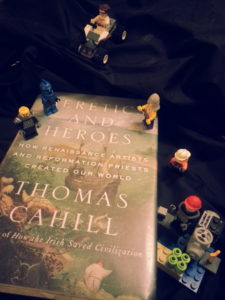 A look back over history shows that there are certain periods in time during which innovation and cultural change dramatically increases. The book
A look back over history shows that there are certain periods in time during which innovation and cultural change dramatically increases. The book  It may sound crazy to say that we have to embrace the suffering this life throws at us. The thing is that if we ignore the pain or claim that we have victory over every pain, sorrow, or fiery dart from hell, then we have set ourselves up for even more pain. The reality is that there is a lot of pain and sorrow in the world today – rape, sickness, heartache, poverty, death, betrayal, bullying, addictions, and more. If we are going to live in this world, as we do, then we
It may sound crazy to say that we have to embrace the suffering this life throws at us. The thing is that if we ignore the pain or claim that we have victory over every pain, sorrow, or fiery dart from hell, then we have set ourselves up for even more pain. The reality is that there is a lot of pain and sorrow in the world today – rape, sickness, heartache, poverty, death, betrayal, bullying, addictions, and more. If we are going to live in this world, as we do, then we  When my wife and I were in our mid-twenties, we were invited to join a team of folks who were planning to start a new church in Sweet, Idaho, an hour’s drive north of Boise. At first we were just going to help out on Sunday evenings for about six months while the church got up and running. God, however, had different plans. One thing led to another and soon we were selling our house and moving to Sweet, to work with the church and love the community. The next nine years were full of joy, happiness, sorrow and heartache. It was hard giving up one lifestyle to embrace another. To go from riding a bicycle to work, to driving an hour each way; to go from a vibrant social life in the big city to embracing a slower pace of life among a predominantly retired community. Then there were the hours of volunteer work with the church, setting things up for the service, tearing it down, week in and week out, planning different events, etc.
When my wife and I were in our mid-twenties, we were invited to join a team of folks who were planning to start a new church in Sweet, Idaho, an hour’s drive north of Boise. At first we were just going to help out on Sunday evenings for about six months while the church got up and running. God, however, had different plans. One thing led to another and soon we were selling our house and moving to Sweet, to work with the church and love the community. The next nine years were full of joy, happiness, sorrow and heartache. It was hard giving up one lifestyle to embrace another. To go from riding a bicycle to work, to driving an hour each way; to go from a vibrant social life in the big city to embracing a slower pace of life among a predominantly retired community. Then there were the hours of volunteer work with the church, setting things up for the service, tearing it down, week in and week out, planning different events, etc. Written in the style of wisdom literature with a “delicate balance of fiction and nonfiction,”
Written in the style of wisdom literature with a “delicate balance of fiction and nonfiction,”

 There are times when things that we should know about are lost in the avalanche of information that surrounds us each day. The stories of what happened to – and what is happening to – the Palestinian Christians is something that we should know more about. Sadly most of American Protestant Christianity has bought into a theological system that rejects these followers of Jesus while embracing the secular state of Israel.
There are times when things that we should know about are lost in the avalanche of information that surrounds us each day. The stories of what happened to – and what is happening to – the Palestinian Christians is something that we should know more about. Sadly most of American Protestant Christianity has bought into a theological system that rejects these followers of Jesus while embracing the secular state of Israel.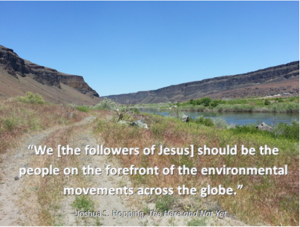 It is a sad but true reality that many of the followers of Jesus do not take care of the creation the Creator King made. Instead, they quote selected Bible verses, chosen to support their view that what they do to the environment (biological and geological) does not matter. After all, it is all going to burn anyway. Or so goes the standard view of a lot of Christianity today. In stark opposition to this view is the concept of Kingdom Theology which declares that the rule and reign of the King over every area of life and everything, created or uncreated, invisible or visible.
It is a sad but true reality that many of the followers of Jesus do not take care of the creation the Creator King made. Instead, they quote selected Bible verses, chosen to support their view that what they do to the environment (biological and geological) does not matter. After all, it is all going to burn anyway. Or so goes the standard view of a lot of Christianity today. In stark opposition to this view is the concept of Kingdom Theology which declares that the rule and reign of the King over every area of life and everything, created or uncreated, invisible or visible.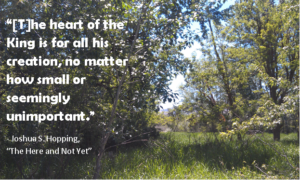 The Book of Ezekiel also tells us that the Creator King was upset at the people of Israel for defiling the land through “their conduct and actions” (Ezekiel 36:17). Specifically, God was telling the people that their worship of idols and misconduct (i.e. the spilling of blood in the land through murder, human sacrifice, injustice and war), was harming the environment around them. The land itself had become defiled and, therefore, God was going to have them removed for a period of time. Later on, after the land had rested and the people have repented, the Creator King would bring the people of Israel back into the Promised Land and make it plentiful again with an abundance of grain, crops, and fruit (Ezekiel 36:24–36).
The Book of Ezekiel also tells us that the Creator King was upset at the people of Israel for defiling the land through “their conduct and actions” (Ezekiel 36:17). Specifically, God was telling the people that their worship of idols and misconduct (i.e. the spilling of blood in the land through murder, human sacrifice, injustice and war), was harming the environment around them. The land itself had become defiled and, therefore, God was going to have them removed for a period of time. Later on, after the land had rested and the people have repented, the Creator King would bring the people of Israel back into the Promised Land and make it plentiful again with an abundance of grain, crops, and fruit (Ezekiel 36:24–36).